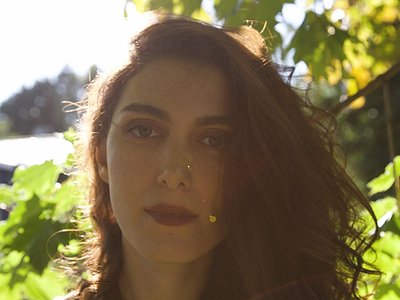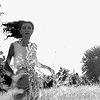Part 2
There are many descriptions of the ideal state of mind for being creative. What is it like for you? What supports this ideal state of mind and what are distractions? Are there strategies to enter into this state more easily?
I work really laboriously to protect my creativity, and I know by experience that forgiveness is the most potent vessel for a fertile mind. If being creative is our concluding nature, then freedom is about being good at letting go of things that don't serve that essence. It's a lot of cyclical work, but it doesn't have to become a punishment. You're not in a boot camp if you're doing what you love, you just do it the way you know how to, and forget that there are other ways to live, you know? It does get a little reclusive.
It helps to be entertained by something other than sitting in front of the same thing every day. That’s where life happens! Breaks are central to coming back to something, feeling more revived. So, I like to cook, go for walks. anything that softens the mind and takes it off things. I try not to compare myself with other people - that really burdens the imagination. I spend time with people I admire and could count my close friends on one hand. The rest is solitary.
Could you describe your creative process on the basis of a piece or album that's particularly dear to you, please? Where did the ideas come from, how were they transformed in your mind, what did you start with and how do you refine these beginnings into the finished work of art?
A friend, who is going through menopause, tells me that I work like one of her heatwaves. I don't know what that's like, but she is probably onto something.
Sometimes I have no idea what I'm doing until I'm a few months in, showing it to someone. All the leaps I have taken have come from some ridiculous mistake I made. I am full of those, and they are crucial to my growth. I wrote a number of compositions in 2018 that changed course and turned into a play a year later. After getting an offer to commission it, we turned it into a performance, and then it became a film, which is coming out by the end of this year (Crow Without Mouth).
Producing and performing has to be instinctual for me. If it's forced, it gets too convoluted and paralyses the magic. When I was younger, I was critical and went after something I could correct to the brink of precision, but one of the advantages of age is that it passes! Now it's more natural; I prefer progress over perfection and have learned to enjoy my work instead of proving a point with it.
How is playing live and writing music in the studio connected? What do you achieve and draw from each experience personally? How do you see the relationship between improvisation and composition in this regard?
I don't know what connects them other than the impulse of an itch. Music is a lot like the iceberg's tip, where writing and performance are a subconscious process I'm still discovering. I may produce something assuming it was for an album; then I find out that it was for something entirely different, like doing a play. It's two worlds apart, and it makes you question the entire arrangement, and sometimes even yourself! That's how it is when you're working between mediums...
How do you see the relationship between the 'sound' aspects of music and the 'composition' aspects? How do you work with sound and timbre to meet certain production ideas and in which way can certain sounds already take on compositional qualities?
Ideas for narratives may be conceptual but sounds rarely are. The way I experience singing, it's personal fulfilment. Composing is a way to capture that; it's more conscious. Titles, lyrics, and other forms of information are a way to communicate the whole essence to the listener.
Our sense of hearing shares intriguing connections to other senses. From your experience, what are some of the most inspiring overlaps between different senses - and what do they tell us about the way our senses work? What happens to sound at its outermost borders?
Sound has very little value unless it evokes emotion. At least that's what counts for me when a listener feels struck with a sense of closeness. It’s hard to articulate what it does. A song can feel like a homecoming of the soul, and often words become too material for it. I admire Meredith Monk for that reason. Emotion is the sole language in her work. She uses vocal techniques, utilising the voice as an instrument instead of conveying meaning through words. There is something endearing and animal about that, and it makes it easy to empathise with. It’s powerful to have a such a skill. I don't know if music is meant to have a function, but at least it can make us aware of how we feel - like a trademark of being alive.
Art can be a purpose in its own right, but it can also directly feed back into everyday life, take on a social and political role, and lead to more engagement. Can you describe your approach to art and being an artist?
It's a big question with a lot of answers. Art, science, and politics can be powerful allies, but we need a far better understanding of our inner world before understanding the outer. It's not enough reading about people's experiences. We need to be contradicting ourselves and forgiving that process too. Otherwise, how do we learn? All artists who have created an inner world for themselves and dare to put it out, knowing they might change their minds tomorrow, understand the importance of possibility and failure. But we are hard on each other and seem to forget that judging is a mere shrewdness on ourselves. I suppose that is what sets the arts apart from professions that rely on persuasion. Art is suggestive, and it reserves a place to observe the world as a mirror.
In a way, it is remarkable that we have arrived in the 21st century with the basic concept of music still intact. Do you have a vision of music, an idea of what music could be beyond its current form?
Milan Kundera wrote a book, The Unbearable Lightness of Being. It's about these four characters and their love affair during the Prague Spring in the 60s. The timeline breaks into unusual chapters that unfold the same events but under the four protagonists' individual perspectives. A friend was reading it to me, and I remember thinking about how that would translate into writing music. What would it sound like interweaving a collage of vistas into the same story?
When I think about it, it's more of a concept than a potential form. But for a long time, I was mixing up the theatre with interpretations of Daoism, for all the same reasons. They exhibit opposing qualities of punishment and forgiveness by revealing possible states of perspectives. All art forms do, like religion, they open bits of truths. They cut you but they also heal you. If they didn't, we'd be as lopsided as when watching the news!
I think a lot of storytelling has to do with trust. We believe in the narrative when it's suggesting different possible realities all at once. I want to wrap my head around it someday, but it does require a sense of sophistication... It requires more life experience.






